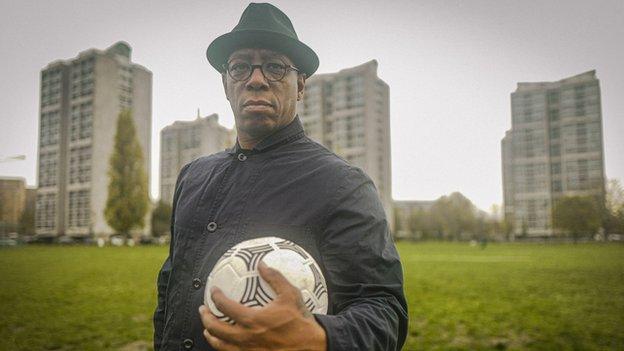Ian Wright: Home Truths - 'a lot of my anger was pain and unhappiness'
- Published

In a new documentary, former England, Arsenal, Crystal Palace and West Ham striker Ian Wright shares his own story and investigates what effect growing up in a psychologically abusive and violent home has on children in the UK. Watch Home Truths on BBC One at 21:00 BST on Thursday, 6 May and catch-up on iPlayer.
Many of you are aware of my story, but for different reasons.
For some it was scoring goals and celebrating with the fans, for others it's for working on Match of the Day, and for a lot of young fans it's being one of the legendary Icons in the Fifa video game.
No matter how people see me, football is always somehow involved. I'm not sure where I would be without it.
Football changed my life. It helped me find much-needed direction when I was growing up and has helped me transition into a new career after playing for so many years.
To go from watching Match of the Day as a child, to now being part of the show, is still a dream come true. No matter how many times I hear that MOTD intro, it still makes me smile.
The reality is that many of the skills I gained through playing football are still helping me today.
When I was younger, football was all about fun, but at the same time, it was a huge release for me.
What many people don't realise is that while I was playing, a lot of the anger I showed was not being channelled in the right way.
It wasn't just my desire to win or my frustration at how the game was going, a lot of it was pain and unhappiness.
I was always on edge. It was trauma within myself that took me years to process.
This was something that had been happening from when I was a little guy.
I could be playing football on the estate and start crying if we lost. I could get into a fight if I didn't like the way someone spoke to me.
All of this stemmed from my situation at home. I was not happy.
My step dad was horrible. It wasn't just physical abuse but the emotional abuse - the words that were used on a daily basis.
Hurtful words that came from my mum that never leave you. It was a repressive environment.
Home was a difficult place to be and I always wanted to escape. I didn't feel like I could talk to anyone apart from my older brother Maurice. He was my guy. He protected me as much as he could.
That's why the Home Truths documentary is so important to me. Last year during Desert Island Discs, I opened up for the first time about some of the experiences I lived through as a young kid.
Domestic abuse is something that still feels like a taboo subject. We don't talk about the effects on children in those environments.
Some 20% of children in the UK have lived with an adult perpetrating domestic violence., externalIn 2019, 1.6 million women were recorded as victims of domestic abuse, external and in 90% of cases of domestic violence there are children present in the house. , external
The response after Desert Island Discs was overwhelming and still makes me emotional to this day. So many people who have lived through similar experiences expressed their thanks to me for sharing my own.
I felt like I hadn't done anything, but I also knew I could do more - for myself and for others - to understand why I behaved in certain ways, to show others that it's OK to talk about these things and to process that being abused is not your fault.
National lockdowns have made situations even worse for women and children who experience physical and emotional abuse. It's the right time to talk about it. This documentary is as much for myself as it is for others.
Talking is important. It's ironic that something I do for a living is something I found so hard to do growing up.
A million kids in the UK are living with domestic abuse and this has to change. I want the conversations within the documentary to allow people to see, and feel, some hope.
We can and must break the cycle of abuse.